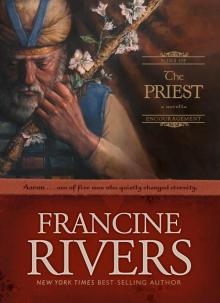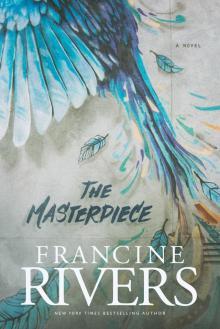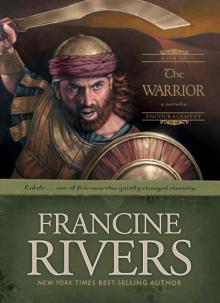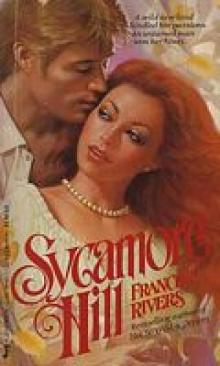- Home
- Francine Rivers
The Masterpiece Page 3
The Masterpiece Read online
Page 3
The self-guided tour was an eye-opener. The bathroom off the office was lovely with cream-colored marble, polished nickel fixtures, and white crown molding. The fancy toilet with a heated seat and the luxurious shower made it clear the house had never been meant for a bachelor.
The rest of the five thousand square feet was equally gorgeous and echoed with every step. One large room was furnished with a torturous home gym contraption to keep the man in shape. Another contained an unmade California-king bed, armoire, nightstands, and dirty clothing and towels on a red marble floor. The other bedrooms were large white cells without furniture or window treatments, each with a private bathroom with expensive polished nickel or burnished bronze fixtures.
Roman Velasco’s studio had been the biggest surprise. He’d turned what must have been the master suite into a cluttered work studio. Light streamed in from the bank of windows, undoubtedly the reason he’d chosen the space for work. He’d splattered paint all over the beautiful hardwood floor. Crumpled papers looked like monstrous dust bunnies scattered about the room. Didn’t the man own a wastebasket?
The air smelled of paint, oil, turpentine. A cheap bookcase held dozens of volumes on art and biographies of famous painters, as well as sketch pads. Brushes of various sizes stood in Yuban coffee cans. Tubes, spray cans, and jars of paint lined makeshift shelves constructed of boards and cinder blocks. He had several easels set up, each painting senseless and modernistic. She hadn’t seen any work framed or hanging anywhere in his house. Even if she didn’t like what he painted, he should be proud of his work.
And why would an artist use mud-colored paint to cover whatever he’d been doing on the back wall? A five-gallon bucket sat in the corner, along with a tray with a dried-up roller. He hadn’t bothered using a tarp.
He’d received three personal calls. All from women. He didn’t want to talk to any of them. One hung up; two left messages.
The first business-related call came from Talia Reisner, a Laguna Beach gallery owner who wanted to know if Roman was working or playing around.
“Mr. Velasco is in his studio.”
“Thank goodness you’re on board. I’ve been after the boy to hire an assistant for months!”
Grace almost laughed. The “boy” looked thirty, and all man.
Talia rushed on. “He’s been buried under minutiae. We don’t want anything slowing down his momentum. He’s hot right now and getting hotter. In my opinion, he’s just begun to tap his talent. I sold his last painting yesterday, and I’ve had two calls already this morning asking when he’s doing a show. Is he painting? I keep telling him he should be painting!”
Grace had walked to the studio while Talia talked. There must be an intercom system in a house that size, but she didn’t know where it was and doubted Roman knew either. She’d suggest a new phone system where she could put someone on hold and call him. He’d glanced at her when she entered his domain. “One moment please.” She held out the phone. “Talia Reisner. She says she’s your business associate.”
Roman took the phone, punched the button ending the call, and tossed it back. “I’m not her employee. If she calls back, tell her I’m working. That’ll make her greedy little heart happy. If Hector Espinoza calls, I’ll talk to him. Everyone else can go to—” He broke off abruptly with a sheepish smile.
What a first day on the job!
Traffic slowed to a crawl. Grace had gotten off at five, but it would be well after six before she made it to Burbank. She’d have to fill her Civic’s gas tank twice this week, which wouldn’t leave much to save toward a deposit on an apartment. How was she ever going to afford a place of her own? Fighting tears, she tried not to let emotions take over. She’d cried enough in the last year to float a ship.
Grow up, Grace. You live with the mess you make.
Maybe God was punishing her. He had every right, considering how she’d behaved after the divorce.
Ruben, eyes fixed on the television news, raised a hand in greeting as she came in the front door. Alicia, a freshman in high school, and Javier, a senior, were in their rooms finishing homework. Selah had already put Samuel to bed.
“He was fussy, so I put him down at six.” She smiled as she placed the last glasses in the dishwasher. “Your dinner is in the oven, chiquita, still warm. How did it go today?”
“Fine.” She’d stick with him until something better opened. “I’m going to see Samuel.”
“He’s sleeping. Best to leave him alone.”
“I’ll only be a minute.”
“Sit. Eat dinner.”
Grace pretended not to hear. She’d been away from her son all day. She just wanted to hold him for a few minutes.
Samuel lay on his back, arms spread. He looked so peaceful, she didn’t awaken him. Adjusting the soft blanket, she leaned down. “I love you, little man. I missed you so much today.” She kissed his warm forehead and stood at his crib, just watching him sleep. Wiping tears away, she went back to the kitchen. Selah had set out a plate of rice, coleslaw, and a thick, cheesy enchilada. Grace thanked her as she took a seat at the kitchen table. Selah went into the laundry room.
Grace ate alone, cleared and washed her dishes. She joined Selah and started folding Samuel’s clothes. Selah plucked a onesie from her and waved her away. “I can do it, chiquita. Go sit and talk with Ruben.”
It wasn’t the words that stung, but the implication that Selah wanted to handle everything that had to do with Samuel. Grace watched her fold Samuel’s onesie and press it onto a pile of other outfits she had bought. Ignoring Grace, she picked up a small T-shirt.
Grace didn’t want to feel resentful. The Garcias had been kind and supportive for months. When Grace told them she’d changed her mind about giving up Samuel, Selah told her she had time to think things over. Selah was never unkind, but she seemed intent on showing Grace she was a better mother for Samuel.
Lord, I’m grateful. I truly am.
Ruben looked up when she came into the living room. “How did the temp job go? Will it work into something more permanent?”
“Rocky. He’s an artist. He lives in Topanga Canyon.”
“No wonder you were so late getting home tonight.” He glanced at the news program. “Alicia has a volleyball game Wednesday night. We should leave by six.”
Grace got the message. If she couldn’t make it back in time, they’d take Samuel with them, and she’d miss another evening with her son.
Roman’s days became easier with Grace Moore on the job. She arrived promptly at nine, made his coffee, and went to work in the office. He’d already informed her to hold his calls. He told her which to ignore, which to answer. People called frequently, wanting murals. He debated taking on any more, finding them time-intensive and less lucrative than his work on canvas.
He felt pressed, but undirected. Did he want his work hidden away in a private home, or displayed for all to see? Murals gave Roman Velasco legitimacy, even though he was being commissioned to fulfill someone else’s vision rather than his own. He still occasionally spoke his own mind through the Bird’s simplistic graffiti, but with growing risk. It had become a game, more dangerous as time went by.
Rubbing his forehead, Roman tried to fix his mind on the mural. He had a deadline, and it was fast approaching. Don’t think. Just do the work and get the check. Concentrate on that.
Hiring Hector Espinoza had taken the pressure off doing all the work himself. The man was set to begin Roman’s mural for the lobby wall of a new hotel near the San Diego Zoo. Management had hired Roman to create an African savanna scene complete with migrating animals. Roman had almost finished drawing the design on transfer paper, which Hector would use to start the painting. Once Hector finished the transfers, Roman would drive down and do the fine detail work to bring life to the mural.
Roman dropped the pencil and flexed his cramping fingers. When had he last taken a break? He’d been working since sunup. Pushing the stool back, he stood and stretched while walking to the window
s. He looked out at the canyon. Movement caught his eye, and he spotted a jackrabbit making its cautious way across the path down to the cottage the previous owners had built for an aging parent who didn’t live long enough to move in.
He’d been inside the cottage only once, when the Realtor took him on a final walk-through before he signed all the papers. It had the same square footage as the Malibu beach cottage he’d sold for an astonishing amount of money, most of which he’d sunk into this fortress.
Bobby Ray Dean couldn’t get any further away from the Tenderloin than this. He didn’t know who he was anymore. Somehow, Bobby Ray Dean had gotten lost between the Bird and Roman Velasco.
Grace had put the office in order by the end of the second week. She liked to stay busy. She was an active but quiet presence in the house, and he liked that. But this morning, she said she wanted to explain the new filing system. He had a feeling he knew where she was going with that. He’d said he didn’t have time.
A light tap at the studio door made him turn.
“Do you have time to talk now, Mr. Velasco?”
“Depends on what you want to talk about.” He faced her. “Don’t even think about quitting.”
“I told you I’d give you two weeks. You don’t really need a full-time personal assistant.”
“I like the way things are working.”
“I have a lot of downtime.”
“There are other things you could do for me.” He saw the wary look back in her eyes. She still didn’t trust him, but then, how well did they know one another? Everything had been strictly business since day one. Just the way they both wanted it. “Cooking, laundry, a little housecleaning.”
“You eat frozen meals. A cleaning service comes every Wednesday to pick up your laundry. And I’m sure you could easily find someone to change your sheets and make your bed.”
He sensed the innuendo. “I don’t usually invite women up here.” It was easier to leave a woman’s home than ask one to leave his.
“I’m not interested in your private life, Mr. Velasco.”
And yet she knew more about him than anyone else. Not that his paperwork told the whole story. “Can we cut the mister? Call me Roman.” He’d liked the formality at first. Now it annoyed him. “How about making a grocery run for me? I can’t spare the time right now. I’ll reimburse you for gas.”
“I’ll need a list.”
He gave a soft laugh. “You live by lists, don’t you?”
Her shoulders relaxed, and she smiled back. “You did say you wanted someone detail-oriented.”
“You probably know better than I do what I need.” He gave her two hundred dollars and told her the closest supermarket was in Malibu.
The phone rang several times while she was gone. He didn’t bother picking up. He ignored the front door chimes, too, until he realized it might be Grace. Opening the door, he took the two bags of groceries. “Any more?” She said she could manage and headed back to her car.
Sitting at the kitchen counter, Roman watched her empty the reusable bags. She stacked pizzas and frozen dinners in the freezer and put packaged salad mixes in the fridge. She’d bought orange juice, eggs, cottage cheese, and two jars of peaches, though he’d forgotten he needed them. She seemed to know what he liked.
Glancing at the clock, she quickly folded the bags. “I have to leave. I’m going to hit traffic.”
“Some calls came while you were gone. I let them go to voice mail, but—” She looked stressed, and it was almost five thirty. “They can wait until tomorrow.”
“Are you sure?”
“Go.”
She did. As the front door closed behind her, Roman felt the silence fill the house.
BOBBY RAY, AGE 15
Girls developed quick crushes on the new boy with dark hair and eyes, the skin tone that announced his mixed-race parentage. Boys noticed their girlfriends watching Bobby Ray Dean, but learned quickly that he never backed down from a fight—or lost one. He followed his own set of rules: don’t start a fight, but hit hard if one comes to you; knock your enemy down until he stays down; watch your back.
He was drawn to gang kids. They broke rules and had their own law. No one bothered them, and they always had money in their pockets. They looked and acted like family members. When Reaper, one of the older boys, offered him fifty bucks to deliver a package to a club on Broadway, Bobby Ray didn’t think twice about saying yes. He knew this was a test, a way in, a chance to belong somewhere.
Bobby Ray realized before he’d gone a block the whole job had been a setup. Someone had called the cops. Rather than dump the package, Bobby Ray did what he’d always done. He’d been running through the streets of San Francisco from his first nights in foster care. He knew every street, alley, and park. He knew how to get from one rooftop to another, go down a fire escape and scale a cyclone fence, swing over the top and drop to the other side. He delivered the package.
At school the next day, he found Reaper and demanded his fifty bucks. Respect crept into Reaper’s eyes. He paid up and invited Bobby Ray to a party, where he met the brotherhood. Wolf was sixteen, a Denzel Washington look-alike with two girls hanging on his arms. Lardo weighed over two hundred pounds and had a nervous laugh. White Boy gave a nod of greeting without looking away from a computer game. Bouncer rocked on the balls of his feet and looked ready for a fight.
It didn’t take long to get hooked on what the gang had to offer. The problem was, Bobby Ray didn’t like carrying what had killed his mother. Every night after he made a delivery, he’d dream about Mama in a cheap motel room. She’d be sitting on rumpled sheets, her body emaciated, her face ravaged by guilt and shame. She’d cry and hold her hands out to him. You know I love you, baby. You know I’m gonna come back. Don’t you? He’d wake up in a cold sweat, heart pounding, tears still wet on his cheeks.
The fourth time it happened, Bobby Ray raked his hands through his hair and sat on the side of the bed, fighting down nausea. If he said no now, Reaper would see it as a challenge to his authority. Reaper had earned his name by getting away with murder. Bobby Ray knew explaining his aversion would reveal his weakness, something he couldn’t do with the guys he hung out with now. He wanted their respect. But he wanted it on his own terms.
He needed to think, and he did that best when he was out wandering the streets after dark. Pushing the curtains aside, intending to climb out the window of his foster parents’ apartment, he spotted a guy dressed head to foot in black, tagging the wall across the street. Bobby Ray sneered. One letter and a number? That was the best he could do?
Bobby Ray stared at the tagger’s work, his mind flashing with ideas of what he could have done with a couple cans of spray paint.
The adrenaline rush came along with the ideas. Heart racing, he started making plans. He saw a way to stay in the gang while steering clear of the drug trafficking.
Bobby Ray hugged the wall and inched along the narrow ledge on his toes. He reached the drainpipe and climbed, hand over hand. When he could grip the edge of the roof, he pulled himself up and swung over. He got a running start and leaped the narrow alley, dropping and rolling onto the neighboring roof.
A fire escape took him down the other side. He spent the next few hours checking out graffiti. Most was messy, clearly done in haste. A few pieces impressed him, though Bobby Ray knew he could do better.
He had ideas that would blow minds, make people talk. It would have to be a high place, a risky place, a place where the piece couldn’t be easily buffed by city workers.
All Bobby Ray had to do was get his hands on a few cans of spray paint, and he could show Reaper what a real gang tagger could do. Bobby Ray’s delivery days were over. He’d be in the gang with all its assets, without taking part in the gang’s real business.
Suspended in a climbing harness, Bobby Ray hung over the side of the building. He pulled a can of red spray paint from his pack and worked fast. Lardo paced on the roof, keeping watch on the streets below. He swore. “Did yo
u have to pick a place where anyone and his brother can see you?”
Bobby Ray laughed. He had to take risks to establish his reputation. The higher, the better. “Another two minutes.”
“Cops! Two blocks down!” Lardo hauled on the rope.
Bobby Ray gasped and swore as the harness cut into his groin. “Wait!” He swung to one side and grabbed hold of a pipe. Pressing against the brick wall, he went still. He had dressed in black for a reason. No one would see him unless they looked up. Cops usually kept their eyes at street level, not four stories. He calculated how long it would take to have Lardo get him to the roof and then to stow his gear and paint supplies in the backpack. He stayed flush with the wall and looked down without moving. The squad car slowed, shooting a beam of light against the wall.
Bobby Ray spit out a profanity. “Pull me up!” He gritted his teeth against the hard pinch of straps as Lardo yanked on the rope. A can of paint fell out of his backpack. It exploded in front of the squad car. The beam of light swung up. Turning his face away before the spotlight pinned him, he felt Lardo yank hard, and he grabbed hold of the wall and swung onto the flat roof.
Unsnapping the harness, Bobby Ray reached for his backpack. “Forget it!” Lardo groaned. “Come on!” He ran for the stairs. He stopped and looked back.
Bobby Ray told him to be cool. “They didn’t see you, bro.” He stuffed his gear into the backpack and tossed it onto the roof on the other side of the alley. He moved back far enough to get a running start and sailed across, hit hard and rolled to his feet.
Halfway down the block, he ducked down and watched two officers questioning Lardo on the street. They let him go. They hung around another minute or two, checking the alley with flashlights. When they finally returned to the squad car and left, Bobby Ray went back. He didn’t have Lardo teaming with him, so he had to tie the rope and walk down the wall. He worked for another few minutes and used the black marker he’d made from PVC pipe to write BRD.

 An Echo in the Darkness
An Echo in the Darkness A Lineage of Grace
A Lineage of Grace The Prince: Jonathan
The Prince: Jonathan Bridge to Haven
Bridge to Haven The Priest: Aaron
The Priest: Aaron Her Mother's Hope
Her Mother's Hope Redeeming Love
Redeeming Love The Scarlet Thread
The Scarlet Thread The Masterpiece
The Masterpiece The Last Sin Eater
The Last Sin Eater The Prophet: Amos
The Prophet: Amos As Sure as the Dawn
As Sure as the Dawn Her Daughter's Dream
Her Daughter's Dream A Voice in the Wind
A Voice in the Wind The Warrior: Caleb
The Warrior: Caleb The Scribe: Silas
The Scribe: Silas And the Shofar Blew
And the Shofar Blew The Atonement Child
The Atonement Child Unshaken_Ruth
Unshaken_Ruth Unspoken_Bathsheba
Unspoken_Bathsheba The Scribe
The Scribe Sons of Encouragement
Sons of Encouragement The Shoe Box
The Shoe Box Sycamore Hill
Sycamore Hill Unafraid_Mary
Unafraid_Mary Marta's Legacy Collection
Marta's Legacy Collection